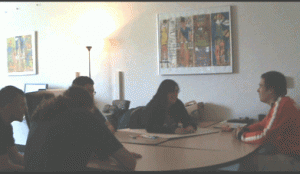The Final Oral Examination For the Degree of
DOCTOR OF PHILOSOPHY
(Curriculum Studies)
Yu-Ling Lee
Wednesday, May 10, 2017. 12:30 pm
Room 207, Anthropology and Sociology Building,
6303 Northwest Marine Drive
DESIGNING TECHNOTHEOLOGIES: ETHICS, PEDAGOGIES, AND SPIRITUALITIES IN MAKER ACTOR-NETWORKS
ABSTRACT: The purpose of this study was to understand how religion and spirituality matter in the consumer use, design, and engineering of media and technology. Specifically, the research questions were: 1) What role do ethics and values perform in maker and hacker networks? 2) How are ethics and values integrated and manifested throughout the design process in maker or hacker networks? 3) What are the routines, rituals, and subjective well-being of participants in the maker or hacker design process? The research setting was the designers in the maker community in Vancouver and technologists associated with Code for the Kingdom in Seattle. All designers and technologists in Vancouver and Seattle have independent projects at various levels of collaboration. I recruited seven participants affiliated with the Vancouver maker community for in-depth analysis of their design process. In Seattle, I recruited two hackers who participated in Code for the Kingdom, a Christian organization that hosts hackathons for altruistic and religious purposes. Their focus on innovation, design methodologies, and critical making allowed me to discern their values and ethics through their design process. These participants have different perspectives on religion and spirituality, which make their technotheological networks complex. Case studies facilitated in-depth examination of makers and hackers as the main actors of our inquiry. The use of video in dialogue with ethnographic inquiry allowed for nuance, discerning complexities, and giving form to expression in designing technotheologies. Conceptually, the research is framed by actor-network theory (ANT) and value sensitive design (VSD), enabling the study to discern how participants discover, design artifacts, make meaning, develop values, and maintain a sense of the good life and well-being, emotional and spiritual. Findings indicate that among the makers and hackers, technotheological networks articulate specific values alongside technological creations, practices, and personal ways of being. In their own unique ways, these makers and hackers inquire into the materialized morality and design phases of ethically responsible decision making processes. Conversely, the non-human actors express their own values within technotheological networks. My role as a techno-theologian helped facilitate competing value claims by positing a normative focus and by temporarily opening black boxes.
EXAMINING COMMITTEE
Chair:
Prof Richard Young (Counselling Psychology)
Supervisory Committee:
Prof Stephen Petrina, Research Supervisor (Curriculum Studies)
Prof E. Wayne Ross (Curriculum Studies)
Prof Francis Feng (Curriculum Studies)
University Examiners:
Prof Kerry Renwick (Curriculum Studies)
Prof Brian Wilson (Kinesiology)
External Examiner:
Prof Matt Ratto

 Follow
Follow
